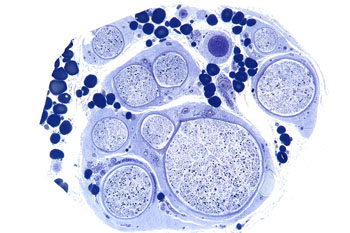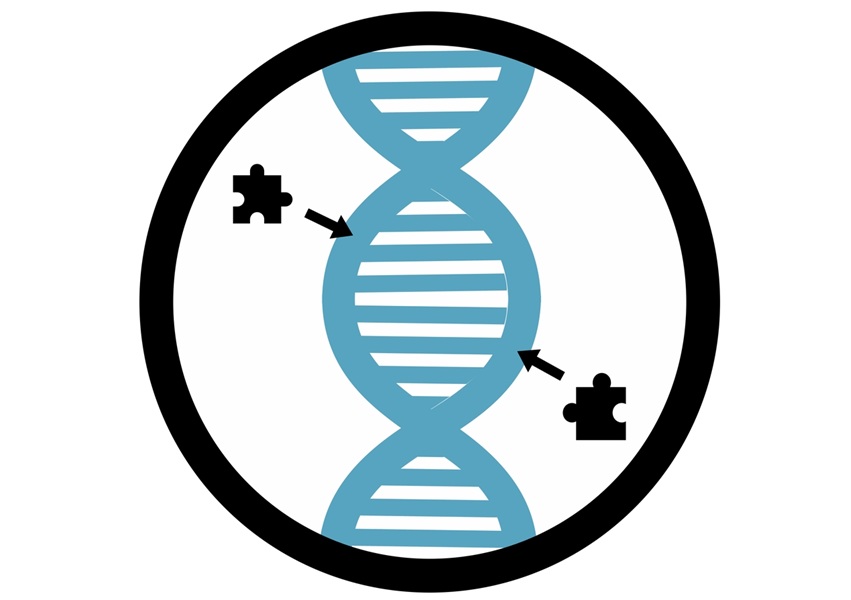Genetic Cause Deciphered for Inherited Nerve Damage Afflicting Older Adults
By LabMedica International staff writers
Posted on 05 Oct 2016
An international team of researchers has identified a gene, MME, with a causative link to late-onset autosomal dominant axonal polyneuropathies. Patients initially develop loss of sensation and pain, then the illness can advance rapidly and lead to paralysis, inability to walk, and wheelchair dependency.Posted on 05 Oct 2016
Rare loss-of-function mutations in the MME gene, encoding the metalloprotease neprilysin, underlying the disease were discovered by an international team under the guidance of researchers at Medical University Vienna (MedUni Vienna; Vienna, Austria) and University of Munich (Munich, Germany).

Image: A low-magnification micrograph showing peripheral neuropathy (vasculitis) (Photo courtesy of Wikimedia).
"The gene mutation leads to an enzyme deficiency which probably triggers nerve damage. In future, the balance of the reduced enzyme activity could represent a novel therapy approach," said lead author and study manager Michaela Auer-Grumbach, MedUni Vienna. Polyneuropathy occurs in 2-3% of the population and in 7% of those over age 65. The cause is still unclear in up to 50% of affected people and a causal therapy is not yet available for this group of patients.
The origin of this discovery was 3 unrelated Austrian families where several members between ages 55-80 initially noticed a loss of sensation and discomfort in the toes, which spread to the knees within just a few months. This was often accompanied by pain as well as a relatively quickly advancing muscle weakness when lifting toes and feet. "After a few years, walking freely was often no longer possible," said M. Auer-Grumbach.
Despite extensive research, initially the cause could not be clarified. "Due to the rapid deterioration of the symptoms, some patients were initially treated with unsuitable medication, which showed no improvement, but often caused considerable side-effects. Based on the poor response to anti-inflammatory medication, but also due to the familial accumulation of polyneuropathy, we ultimately assumed a genetic cause, even though the late start of the disease seemed rather atypical for inherited polyneuropathy,” explained M. Auer-Grumbach.
“An analysis of the entire exome of the patients [i.e. the protein-encoding genes] resulted in a serious genetic deviation in the MME gene, which is responsible for the formation of the neprilysin enzyme,” she added.
Together with Jan Senderek, University Munich, who was aware of similar patients in Germany, the MME gene was examined in other patients, and following additional collaborations with European and American work groups mutations could be identified in 28 patients from 19 families. Further confirmation was then provided by results of measurements of neprilysin in the blood and fatty tissue, which was significantly lower than in control persons. A study from Japan, that also describes severe polyneuropathy at a complete lack of neprilysin, confirmed the Vienna and Munich study results.
"Discovery of the cause of this disease allows the specific genetic diagnostic and consultancy of afflicted patients and their families and shall avoid ineffective therapies, which are stressful due to undesirable side-effects", said M. Auer-Grumbach, "If further studies confirm that the deficiency of neprilysin leads to the formation of polyneuropathy, there is justified hope that an effective therapy can be developed in the near future, either by enzyme replacement or with active ingredients, which are already known for raising the neprilysin level.”
The researchers are planning further epidemiological examinations of patients with unclear polyneuropathy to discover whether mutations in MME are also of significance in the sporadic (not family-cumulative) appearance of polyneuropathy.
The study, by Auer-Grumbach M et al, was published September 1, 2016, in the American Journal of Human Genetics.
Related Links:
Medical University Vienna
University of Munich













